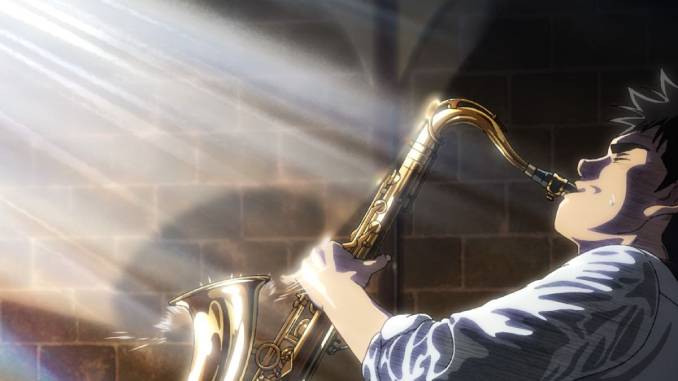
In his first feature since wrapping the critically acclaimed third season of Mob Psycho 100, director Yuzuru Tachikawa takes on the hallowed musical anime. Adapted from Shinichi Ishizuka’s ongoing manga series, Blue Giant is a film about a boy who wants to become the greatest jazz musician in the world, as he takes the most consequential step of his journey: Moving to Tokyo to break into the dying scene.
There are a few directions musical anime can go and, as Blue Giant is about college-aged kids, I was wondering if this might lean more into the reality of gigging and keeping your dreams afloat while struggling to afford rent, or being gatekept by the old guard who can deny someone the few open seats for petty reasons. There are certainly some elements of those realities that concern this story, and I wouldn’t say it’s unlike Whiplash in a few key ways, but Blue Giant borrows much of its DNA from sports anime.
And ya know what? We need more directors like Tachikawa making sports anime. It’s all big feelings and big ideals here. Motivation is the true force compelling one forward, as the kids prove their aspirations are more than naivete and inspire those with the power to make their dream come closer to reality with such passion. Their musical ability is a given, any technical hurdles resolved through character growth.
Blue Giant remains grounded enough. Dai (Yuki Yamada), having left his hometown with a backpack and tenor sax, imposes on an old friend who moved to the city for college. He’s quickly met with the fact that there’s not enough venues left to make playing for money a possibility and begins working to pay his now-roommate Shunji (Amane Okayama) rent while scouring the city for musicians. He quickly meets pianist Yukinori (Shotaro Mamiya), who, unlike Dai, was surrounded by music at a young age. The two’s contrasting backgrounds and proximity to the world of professional music leads them to butt heads and build each other up the way rivalries-turned-bromances do in sports anime. Yukinori is more jaded, but also more technically proficient; Dai’s spirit undeniably comes through his sax’s sound. In anime, at least, that’s enough.
Meanwhile, Shunji is inspired to take up an instrument for the first time and learns to be the combo’s drummer. Having once been a competitive soccer player in high school, Shunji struggles to find fulfillment in the low-stakes, low-commitment effort of his college’s social team. That quintessentially youthful, idealistic spirit of high school sports anime has gone missing, but he finds it again in Dai’s passion for jazz. It’s a similar experience I had in moving from a perhaps overly serious high school band program to a college marching band, and it’s a hard-to-accept shift that many non-professional musicians and athletes will recognize.
With manga editor Number 8 penning the screenplay, Blue Giant feels remarkably concise despite its two-hour runtime. The original manga starts years earlier when Dai gives up basketball to pursue sax after discovering jazz music, but here we focus on a pivotal make-or-break moment and get the full arc of the trio’s development. A solid quarter of that runtime is dedicated to musical performances, which is where we have to talk about not just the soundtrack but also the animation.
More than most films, pianist and composer Hiromi Uehara had an outsized role in shaping Blue Giant. With saxophonist Tomoaki Baba and drummer Shun Ishiwaka, Uehara performs original compositions in addition to her orchestral score. They’re great. They’re perhaps not as mind-melting as the performances in film, with Dai nearly going Super Saiyan as he glows and bends space around him, but great nonetheless. Recorded with improvisational solos, the music reflects the film’s somewhat unique production pipeline. During combo recordings, the team at studio NUT recorded motion-capture footage of the musicians to use in their animation, which is where things start to fall apart.
There are literal flashes of abstraction, characteristic of shonen and Tachikawa’s work on Mob Psycho 100, where the musical performances shine, but the reliance on 3DCG (directed by Masato Takahashi) flops. There’s a narrow gulf between good 3DCG (Chainsaw Man) and bad 3DCG (2016’s Berserk)—it either works or it doesn’t. And here it mostly does not. I find it hard to believe that Baba was so, well, animated. Dai’s gyrations lack inertia and are often out of tune with the song being performed. While Yukinori’s hands can be animated with great subtlety while playing the piano, none of the performer’s faces are rendered with much expression in 3D, adding to the impression that they’ve suddenly become mannequins.
This formal shift is hard to pull off, and something I’ve only really seen done convincingly by MAPPA and Khara, and the camerawork in these moments doesn’t feel interesting enough to justify this direction. Still, the 3DCG’s use being limited to only parts of the musical sequences keep it from greatly deterring more sensitive eyes. And outside of these scenes, there are some conspicuously gorgeous highlights as well, with detailed nighttime cityscapes looking, at times, lifted from Mamoru Oshii’s Patlabor.
Blue Giant is a somewhat tropey story that captures its characters’ big feelings, and its incorporation of live combo recordings contributes something unique to the steadily growing canon of musical anime. While not quite the feature I would’ve expected from Tachikawa after Mob Psycho 100, it’s a strong next step in the director’s career.
Director: Yuzuru Tachikawa
Writer: Number 8
Starring: Amane Okayama, Yuki Yamada, Shotaro Mamiya
Release Date: October 8, 2023
Autumn Wright is a freelance games critic and anime journalist. Find their latest writing at @TheAutumnWright.